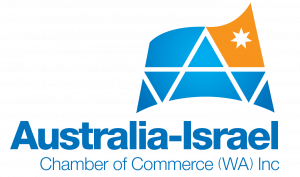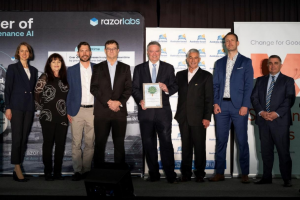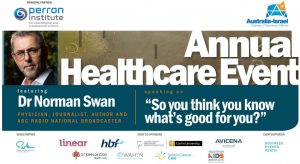Article from the AICC(WA)’s Healthcare Counterpart online event hosted on Wednesday 29 July
2020.

For many years a common learning from Israel’s economic activity has been that “innovation is driven
by necessity”. Whilst it is not often that Australia’s business and social development is faced with the
need to be rapidly responsive, agile, and to deliver under pressured circumstances, the COVID-19
experience is an exception, placing WA’s Health Department into rapid crisis response.
Suddenly preparing for a worst case scenario, which could have easily been far more severe than it
has been to date, the WA Health sector was able to rise to the challenge with a demonstration of
preparedness and resilience.
Through the AICC(WA)’s Counterpart series and Annual Healthcare event 2020, those at the helm of
delivering the public sector heath response to Covid-19 engaged in dialogue and comparison between
the situation in Israel and locally in Western Australia.
The Director General of WA Health, Dr David Russell-Weisz and Dr Robyn Lawrence State Health
Incident Controller and Deputy Chief Health Officer WA provided an account of the WA activity, with
the conversation facilitated by Dr Carlo Bellini, HIP – Health Innovation Performance Consulting. All
three are alumni of the 2019 AICC(WA) Health leaders delegation to Israel and we able to draw on
their first hand knowledge and insight into the Israeli health system.
The Israeli perspective was offered by Professor Arnon Afek MD, MHA whose many roles include
Associate Director General, Sheba Medical Center and Acting Director of Sheba General Hospital. As
a former Director General of the Israeli Ministry of Health and Bureau of Governors of the OECD Health
Committee, Professor Afek is well positioned to share his experience. The Sheba Hospital operates
Israel’s biggest Carona care facility and is also a leading innovation and research facility.
Dr Afek described the Israeli experience of both the first and second wave of the virus. The initial
Israeli plan was well executed, with Dr Afek noting Israel is well prepared for emergency situations
and rapid response due to its geopolitical isolation. The introduction of travel restrictions, local
lockdown and innovative means of strategically sourcing vital pandemic supplies (particularly
ventilators) were all effective.
However Dr Afek also shared the sentiment that “Israel became the victim of our own success” when
it came to the second wave. Israel has not fared as well recently, primarily due to public attitudes and
compliance towards social distancing protocols. The opening of schools and the economy in totality,
combined with a lack of data driven checkpoints and surveillance systems to support Government
decisions have contributed to community spread.
The Western Australian experience was no less daunting when it came to preparedness. Dr RussellWeisz noted that whilst pandemic plans had been developed, they were not to the scale or extent of
what suddenly confronted the Health system, both in terms of capacity and length of disruption. His
ability to deliver has been based on ensuring good governance, particularly balancing local response
directives with Federal support and resource allocations. The focus has been on dealing with both
public health and a clinical response, acknowledging that many previous challenges for WA Health
have been organisational and not community driven.
On the latter Dr Lawrence emphasised the challenge of making decisions in an imperfect world, and
often with a lack of evidence based support towards the broader community impact. Decisiveness
has been the key, and has led to a number of rapid responses. Examples include the transition to
telehealth consults, cruise ship and livestock freight border control, and alternative procurement
approaches that drive agility and innovation. She quoted Premier McGowan in saying “What seems
ridiculous today is being implemented tomorrow”.
Some common themes emerged for both Australia and Israel’s health sector challenges. These
included;
- Fostering innovation through medical research.
- Concentrating on providing PPE, security and confidence for front line staff, and alleviating their legitimate fear of exposure.
- Capturing the cohesive sprit of the people and defining a unified public towards common goals.
- The availability of information through social media channels which can have a negative influence when not factual, asserting a democratic “right not to comply” which in turn creates public health risks.
- The desire to bring a younger generation of workers into the health and medical research sectors.
Whilst a number of cultural similarities and medical research drivers were affirmed, there were also
observations about differences within the innovation structures for the respective countries. It was
noted that there was a higher level of expectation for Government stimulus support in Australia,
whereas the allocation of Government innovation funding in Israel is determined with greater regard
towards market forces. Similarly, Australia has a Federation of multiple states with various levels of
restriction whereas Israel has a single national approach. Western Australia has had the most liberal
regime of restrictions other than the Northern Territory, nonetheless this makes the State susceptible
to complacency.
The panel discussed and compared the vetting of returning travellers, medical research and vaccine
potential alongside associated medical ethics, and population demographics. Empathy associated
with the personal impact and emotional effect on health workers was palpable. Dr Lawrence
described the high personal and emotional toll of making restrictive decisions that have a potentially
adverse impact on the business community and public movement, yet substantially mitigate
community health risks.
The session concluded with an acknowledgement by Paul Israel, Executive Director IACC, who shared
examples of Israeli start-up enterprise that had delivered detection and healthcare benefits.







